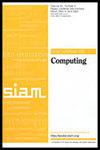Traversing Combinatorial 0/1-Polytopes via Optimization
IF 1.6
3区 计算机科学
Q3 COMPUTER SCIENCE, THEORY & METHODS
引用次数: 0
Abstract
SIAM Journal on Computing, Volume 53, Issue 5, Page 1257-1292, October 2024.Abstract. In this paper, we present a new framework that exploits combinatorial optimization for efficiently generating a large variety of combinatorial objects based on graphs, matroids, posets, and polytopes. Our method is based on a simple and versatile algorithm for computing a Hamilton path on the skeleton of a 0/1-polytope [math], where [math]. The algorithm uses as a black box any algorithm that solves a variant of the classical linear optimization problem [math], and the resulting delay, i.e., the running time per visited vertex on the Hamilton path, is larger than the running time of the optimization algorithm only by a factor of [math]. When [math] encodes a particular class of combinatorial objects, then traversing the skeleton of the polytope [math] along a Hamilton path corresponds to listing the combinatorial objects by local change operations; i.e., we obtain Gray code listings. As concrete results of our general framework, we obtain efficient algorithms for generating all ([math]-optimal) bases and independent sets in a matroid; ([math]-optimal) spanning trees, forests, matchings, maximum matchings, and [math]-optimal matchings in a graph; vertex covers, minimum vertex covers, [math]-optimal vertex covers, stable sets, maximum stable sets, and [math]-optimal stable sets in a bipartite graph; as well as antichains, maximum antichains, [math]-optimal antichains, and [math]-optimal ideals of a poset. Specifically, the delay and space required by these algorithms are polynomial in the size of the matroid ground set, graph, or poset, respectively. Furthermore, all of these listings correspond to Hamilton paths on the corresponding combinatorial polytopes, namely the base polytope, matching polytope, vertex cover polytope, stable set polytope, chain polytope, and order polytope, respectively. As another corollary from our framework, we obtain an [math] delay algorithm for the vertex enumeration problem on 0/1-polytopes [math], where [math] and [math], and [math] is the time needed to solve the linear program [math]. This improves upon the 25-year-old [math] delay algorithm due to Bussieck and Lübbecke.
通过优化穿越组合 0/1 多面体
SIAM 计算期刊》,第 53 卷第 5 期,第 1257-1292 页,2024 年 10 月。 摘要在本文中,我们提出了一个新的框架,利用组合优化来高效生成大量基于图、矩阵、posets 和多面体的组合对象。我们的方法基于一种简单而通用的算法,用于计算 0/1 多面体骨架上的汉密尔顿路径[math],其中[math].该算法使用任何解决经典线性优化问题[math]变体的算法作为黑盒,由此产生的延迟,即汉密尔顿路径上每个被访问顶点的运行时间,仅比优化算法的运行时间大[math]倍。当[math]编码一类特定的组合对象时,沿着汉密尔顿路径遍历多面体[math]的骨架,就相当于通过局部变化操作列出组合对象;也就是说,我们得到了灰色代码列表。作为我们一般框架的具体结果,我们获得了生成矩阵中所有([数学]最优)基和独立集的高效算法;图中([数学]最优)生成树、森林、匹配、最大匹配和[数学]最优匹配的高效算法;顶点覆盖、最小顶点覆盖、[数学]-最优顶点覆盖、双分图中的稳定集、最大稳定集和[数学]-最优稳定集;以及正集的反链、最大反链、[数学]-最优反链和[数学]-最优理想。具体来说,这些算法所需的延迟和空间分别是母集、图或集合大小的多项式。此外,所有这些列表都对应于相应组合多面体(即基多面体、匹配多面体、顶点覆盖多面体、稳定集多面体、链多面体和阶多面体)上的汉密尔顿路径。作为我们框架的另一个推论,我们得到了 0/1 多面体上顶点枚举问题的[math]延迟算法[math],其中[math]和[math],[math]是求解线性程序[math]所需的时间。这改进了布西克和吕贝克已有 25 年历史的[math]延迟算法。
本文章由计算机程序翻译,如有差异,请以英文原文为准。
求助全文
约1分钟内获得全文
求助全文
来源期刊

SIAM Journal on Computing
工程技术-计算机:理论方法
CiteScore
4.60
自引率
0.00%
发文量
68
审稿时长
6-12 weeks
期刊介绍:
The SIAM Journal on Computing aims to provide coverage of the most significant work going on in the mathematical and formal aspects of computer science and nonnumerical computing. Submissions must be clearly written and make a significant technical contribution. Topics include but are not limited to analysis and design of algorithms, algorithmic game theory, data structures, computational complexity, computational algebra, computational aspects of combinatorics and graph theory, computational biology, computational geometry, computational robotics, the mathematical aspects of programming languages, artificial intelligence, computational learning, databases, information retrieval, cryptography, networks, distributed computing, parallel algorithms, and computer architecture.
 求助内容:
求助内容: 应助结果提醒方式:
应助结果提醒方式:


